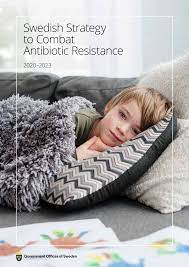Infection prevention & Control
Sweden is a pioneer in infection prevention and control, offering solutions that prevent and reduce infections and improve patient safety in healthcare settings. Swedish companies provide innovative consumables, devices for sterilization, optimization of workflows, infection diagnostics, infrastructure solutions and treatments. Will you collaborate with Sweden for a safer future?
The Challenge
The global fight against AMR and infections
Antibiotic and antimicrobial resistance (AMR) is a global societal challenge and public health issue that threatens sustainable development and our modern healthcare. Often mentioned as “the silent pandemic”, it must be on top of the international political agenda. AMR causes 35,000 deaths annually in Europe and 700,000 globally, a figure that is expected to increase to 10 million by 2050.
Health care-associated infections are the most frequent adverse event in healthcare delivery worldwide and a significant cause of illness and death, especially in the absence of effective antibiotics. Hundreds of millions of patients are affected by health care-associated infections worldwide each year, leading to significant financial losses for health systems. In high-income countries, approximately 30% of patients in intensive care units are affected by at least one healthcare-associated infection, with the frequency in low- and middle-income countries estimated to be at least 2─3 fold higher than in high-income countries.
Swedish Excellence
Sweden as a model - a one health approach
Sweden has paid significant attention to antibiotic resistance and has taken measures for many years to prevent the spread of resistant bacteria and to limit the unnecessary use of antibiotics. The Swedish government has adopted a strategy to combat antibiotic resistance. The Swedish healthcare system is of high quality and well organized, a prerequisite for healthcare hygiene solutions to be implemented throughout the care chain.
Many Swedish companies also offer solutions that help prevent and reduce infections and improve patient safety in healthcare settings, such as innovative consumables, devices for sterilization, optimization of workflows, infection diagnostics, infrastructure solutions and treatments.
Swedish Export Promoting Activites 2024
Quiz
Infection control contributes to reduced spread of infection and sustainable use of antibiotics?
True. Infection prevention and control initiatives work to limit the spread of infections and resistant bacteria in health care facilities, long-term care and congregate settings, in the community and in animal farming. Poor sanitation and hygiene increases the risk for spread of drug-resistant infections, which can result in prolonged illness, hospitalization, and increased costs of health care and production of animal source foods. Effective infection control practices reduce the need for antibiotics, prevent the spread of infections caused by multidrug-resistant bacteria, and help to curb the emergence of antibiotic resistance. Good IPC programmes can reduce health care infections by 70%.
Less than 40% of countries have put in place infection prevention and control programmes for AMR?
True. Only 25% of countries have implemented a national policy to tackle AMR. Less than 40% of countries have put in place infection prevention and control programmes for AMR. Globally it is estimated that only half of antibiotics are used correctly.
Is it true that 1 in 10 patients get a healthcare associated infection while receiving care?
True. Read more at https://www.who.int/health-topics
Was 1975 the year the Swedish strategic programme against antibiotic resistance was founded?
False. The Swedish strategic programme against antibiotic resistance was founded in 1995.
Is sterilization the process by which all life forms are destroyed?
True. A sterile surface/object is completely free of living microorganisms and viruses. Sterilization procedures kill all microorganisms. Methods used in sterilization procedures include heat, ethylene oxide gas, hydrogen peroxide gas, plasma, ozone, and radiation.
Latest publications and Swedish actors within this area
Infection Prevention and Control - the Swedish Way
Swecare continues to showcase Swedish solutions in Infection Prevention and Control and for the global fight against Antimicrobial resistance (AMR). Several examples are gathered in Swecare’s brand new interactive brochure!
Explore our brochureSwedres I Svarm 2022: Sales of antibiotics and occurrence of antibiotic resistance in Sweden
A report on Swedish Antibiotic Sales and Resistance in Human Medicine (Swedres) and Swedish Veterinary Antibiotic Resistance Monitoring (Svarm). Published by: Public Health Agency of Sweden and National Veterinary Institute.
Read the report
The Swedish Strategy to Combat Antibiotic Resistance
The Swedish Government accords high priority to the issue of antibiotic resistance. The overarching objective of the Swedish Strategy to Combat Antibiotic Resistance is to preserve the possibility of effective treatment of bacterial infections in humans and animals. Finding new ways of preventing and treating infectious diseases is ultimately a matter of our future welfare.
Read more about the Swedish Strategy to Combat Antibiotic Resistance
Swedish work on containment of antibiotic resistance
This report describes Sweden’s work on containment of antibiotic resistance. The ambition is that the report or chosen chapters can be used as a “tool-box”, and give inspiration to other organisations and countries that want to develop or further strengthen their work on rational antibiotic use and resistance surveillance within human medicine.
Visit The Public Health Agency of Sweden
ReAct - Action on Antibiotic Resistance
Created in 2005 ReAct is one of the first international independent networks to articulate the complex nature of antibiotic resistance and its drivers. ReAct was initiated with the goal to be a global catalyst, advocating and stimulating for global engagement on antibiotic resistance by collaborating with a broad range of organizations, individuals and stakeholders. This year ReAct is celebrating 15 years of action on antibiotic resistance.
Visit www.reactgroup.orgHow Sweden works with antibiotic resistance
The Public Health Agency of Sweden
The Public Health Agency of Sweden has a national responsibility for public health issues and works to ensure good public health. The agency also works to ensure that the population is protected against communicable diseases and other health threats.
The film presents how Sweden works with antibiotic resistance from a One Health perspective today. It also wants to show the incredible journey Sweden has made as a country over the past 150 years and how that development has been the basis for how we work with antibiotic resistance and the favorable resistance situation we have today. For more information visit www.folkhalsomyndigheten.se








